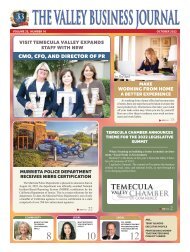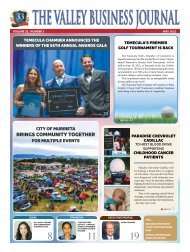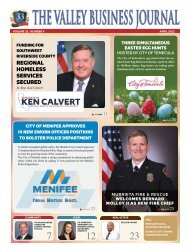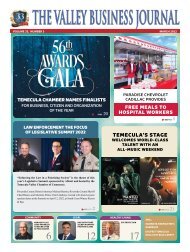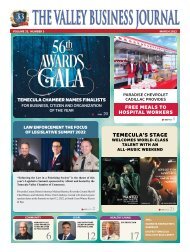Create successful ePaper yourself
Turn your PDF publications into a flip-book with our unique Google optimized e-Paper software.
<strong>June</strong> <strong>2018</strong><br />
THE VALLEY BUSINESS JOURNAL<br />
www.TheValleyBusinessJournal.com<br />
7<br />
Was that MEDIATION, ARBITRATION or VEGETATION?<br />
by Morton J. Grabel, Esq.<br />
Alternative Dispute Resolution [ADR]<br />
- There are alternatives for settling legal<br />
disputes other than litigation including<br />
arbitration, mediation and neutral evaluations.<br />
ADR alternatives are usually<br />
cheaper and more quickly resolved than<br />
litigation. Parties to lawsuits become<br />
increasingly anxious in resolving their<br />
legal disputes as the disputes drag on and<br />
become more expensive. This has lead to<br />
other methods to resolve legal disputes;<br />
collectively known as Alternative Dispute<br />
Resolution (ADR). Usually ADR is<br />
initiated after litigation has commenced<br />
because the court has to have jurisdiction<br />
[authority] over the parties and have<br />
jurisdiction [authority] over the subject<br />
matter of the law suit such as family law<br />
matters, breach of contract and personal<br />
injury claims, etc.<br />
Mediation: is the fastest growing ADR<br />
method. Unlike litigation, mediation provides<br />
a forum in which parties can resolve<br />
their disputes with the help of a skilled<br />
neutral third party. Mediation depends<br />
upon the commitment of the parties to<br />
want to resolve their differences. Clearly,<br />
if one party is committed to resolving<br />
differences and the other party wants<br />
to litigate; mediation will not succeed.<br />
The mediator, never imposes a decision<br />
upon the parties. The mediator’s job is to<br />
keep the parties talking and to help move<br />
them through the more difficult points of<br />
contention. A mediator typically takes the<br />
parties through five stages:<br />
1. First Stage: the mediator gets the parties<br />
to agree on procedural matters,<br />
such as by stating they are participating<br />
in the mediation voluntarily, setting the<br />
time and place for future sessions, and<br />
signing a confidentiality agreement.<br />
One valuable characteristic of this<br />
stage is the parties, who often have<br />
been unable to agree on anything, begin<br />
a pattern of saying yes.<br />
2. Second Stage: the parties exchange<br />
initial positions, not by way of lecturing<br />
each other or the mediator but in a<br />
face-to-face exchange with each other;<br />
if it is possible and the parties are not<br />
completely full of contempt for each<br />
other. If they absolutely despise each<br />
other then go to stage three. Often in<br />
stage two, this is the first time each<br />
party hears the other’s complete and<br />
uninterrupted version. The parties may<br />
begin to see the story has two sides.<br />
3. Third Stage: if the parties have agreed<br />
to what is called a caucusing procedure,<br />
the mediator meets with each side<br />
separately in a series of confidential,<br />
private meetings and begins exploring<br />
settlement alternatives, and assist in<br />
some “reality testing” of their initial<br />
demands. This process, sometimes<br />
called “shuttle diplomacy”, often uncovers<br />
areas of flexibility the parties<br />
could not see before.<br />
4. Fourth Stage: when the gap between<br />
the parties begins to close, the mediator<br />
may carry offers and counteroffers<br />
back and forth.<br />
Finally, when the parties agree upon<br />
the broad terms of a settlement, they formally<br />
reaffirm their understanding of the<br />
settlement, complete the final details, and<br />
sign a settlement agreement. It is essential<br />
to note mediation permits the parties to<br />
retain control of the process at all times<br />
and strike their own bargain.<br />
Another advantage is when the parties<br />
reach agreement in mediation, the<br />
dispute is over—they face no appeals, no<br />
delays, no continuing expenses, nor the<br />
unknown risks such as in a trial.<br />
II. Binding Arbitration: very closely<br />
resembles traditional litigation because<br />
a neutral third party or panel hears the<br />
litigating parties’ arguments and imposes<br />
a final, binding decision that is enforceable<br />
by the courts; usually however the<br />
proceedings are typically less formal than<br />
in a court of law. Another difference, unlike<br />
court decisions; an arbitration usually<br />
offers no appeal process. Thus, when an<br />
arbitration decision is issued, the case is<br />
ended.<br />
III. Early Neutral Evaluation:<br />
An early neutral evaluation (ENE)<br />
is used when either party to a dispute<br />
seek the advice of an experienced individual<br />
- usually an attorney, concerning<br />
the strength of their case. An objective<br />
evaluation by a knowledgeable outsider<br />
can move parties away from unrealistic<br />
expectations and also provide more<br />
insight into their cases’ strengths and<br />
weaknesses. Of course, the success of<br />
this technique depends upon the parties’<br />
faith in the fairness and objectivity of the<br />
neutral third-party.<br />
Please note by reading the information<br />
herein; no attorney-client relationship has<br />
been created. Moreover, the information<br />
provided herein is not to be relied upon as<br />
legal advice for your specific legal needs.<br />
Should you have legal questions feel free<br />
to contact The Law Offices Morton J.<br />
Grabel in Temecula at (951) 695- 7700.<br />
Mort, originally from Philadelphia PA,<br />
attended an ABA Law School, has an<br />
MBA, a Real Estate Broker’s License, a<br />
CA Nursing Home Administrator’s License<br />
and is a member in good standing<br />
of various local Chambers of Commerce.<br />
LEGAL<br />
by<br />
Morton by J. Grabel, Esq.<br />
Steve Fillingim





